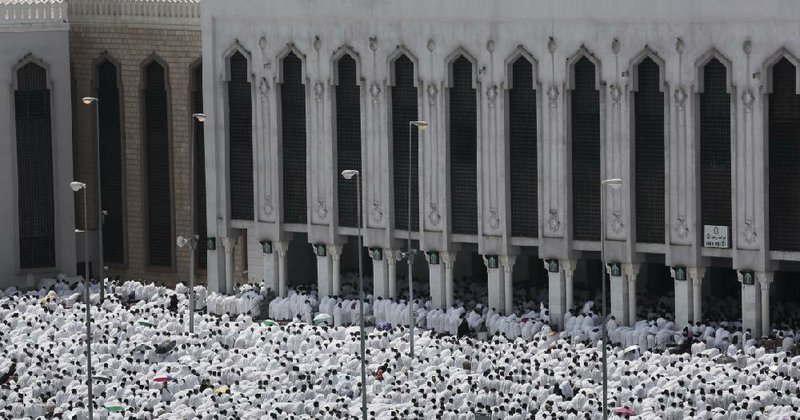MECCA, Saudi Arabia -- Nearly 2 million Muslims on Sunday headed to Mount Arafat near the city of Mecca in Saudi Arabia to mark the peak of the annual hajj pilgrimage.
Muslims on the five-day pilgrimage spent a day there in deep prayer, many openly weeping as they repented and asked God for forgiveness.
Prayer on this day at Mount Arafat, about 12 miles east of Mecca, is believed to offer the best chance of erasing past sins and starting anew. Many Muslims who did not travel to Saudi Arabia for the hajj still fasted from dawn to dusk Sunday for similar reasons.
Many of the pilgrims taking part in this year's hajj climbed a hill called Jabal al-Rahma, or mountain of mercy, in the plain of Arafat to spend time there in supplication. It was on that hill where the Prophet Muhammad delivered his final sermon some 1,400 years ago, calling for equality and for Muslims to unite.
The white terrycloth garments worn by men throughout the five-day hajj are forbidden to contain any stitching -- a restriction meant to emphasize the equality of all Muslims and prevent wealthier pilgrims from differentiating themselves with more elaborate garments.
The day in Arafat is the one time during the hajj when almost all pilgrims from Saudi Arabia and 163 other countries are in the same place at the same time.
Egyptian pilgrim Mahmoud Awny said the feeling of being on Mount Arafat is "indescribable."
"All Muslims on earth wish they could have been here today. Thanks to Allah for enabling me to be here," he said.
The hajj is a physically and emotionally exhausting experience, and this year temperatures reached 108 degrees in Arafat. Volunteers passed out water, juice and umbrellas to shade pilgrims from the sun.
Around sunset, the pilgrims began walking to an area called Muzdalifa, a little more than 5 miles west of Arafat, where they planned to spend the night. They picked up pebbles along the way that will be used in a symbolic stoning of the devil in Mina, where Muslims believe the devil tried to talk the Prophet Ibrahim -- named Abraham in the Bible -- out of submitting to God's will.
Last year, a stampede during the stoning caused the deaths of what the Saudi government said were 769 pilgrims. An Associated Press count put the death toll at 2,426 pilgrims, including 464 Iranians.
The death toll was the key reason for Iran to abstain from this year's hajj. In response, Saudi Arabia has launched a Farsi-language satellite television channel broadcasting the hajj.
Adel al-Toraifi, the Saudi minister of culture and information, told Saudi media that the channel is also being broadcast by radio to Iran, Iraq and Afghanistan, as well as via mobile phone applications and the Internet.
In remarks published by the official Saudi Press Agency on Sunday, al-Toraifi said the channel "aims to broadcast the message of hajj, the eternal meanings of Islam and what is being provided by the kingdom.... to pilgrims and visitors."
Muslims are expected to perform the hajj, one of Islam's five pillars, at least once in their lifetimes if they are fit enough and have the financial means to do so.
A Section on 09/12/2016

